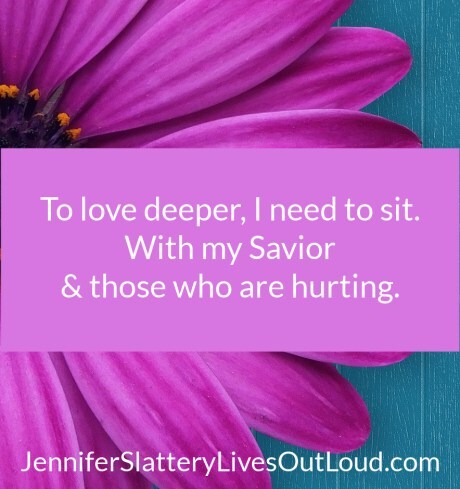Jennifer Slattery's Blog, page 6
July 25, 2024
Hope When Your Trust is Failing – Guest Post by Becky Harling
Sometimes life pummels us so fiercely, we can barely breath. In those seasons, it can feel hard to hold tight to the truths we’ve learned. When our hearts are breaking, we need to know that we’re not alone and God won’t abandon us in our pain. If that’s where you currently find yourself, I hope my guest’s post encourages you.

Hope When Your Trust is Failing
by Becky Harling
I am convinced that trusting God is a lifelong journey. There are days when our faith is strong and steady and then life hits. We receive a cancer diagnosis, or a relationship crumbles, or financial difficulty hits. During those seasons we may start to wonder, “Does my faith really work?”
You are not alone in your wondering.
Asaph the Psalmist cried out, wondering if God had rejected him or if God was really listening to his prayers (Psalm 77:1-2,7).
John the Baptist, when in prison, sent word to Jesus asking, “Are you the one, …or should we look for someone else?” (Luke 7:18-23).
Jerry Bridges, author of Trusting God, Even When Life Hurts, writes that “Trust is not a passive state of mind. It is a vigorous act of the soul by which we choose to lay hold on the promises of God and cling to them despite the adversity that at times seeks to overwhelm us.”1
In other words, there are action steps we can take when we feel our trust is wavering.
What are those steps? Here are just a few:

Remember. When I feel my faith shaking or my anxiety rising, I look back to remember how God has provided or met me in the past. The Psalmist Asaph does this in Psalm 77; he boldly declares, “I will remember the deeds of the LORD” (Psalm 77:11). A few weeks ago, I was having difficulty trusting God with a certain situation. But as I paused and made a mental list of the miracles I had seen God do in the past, my faith was strengthened. The same principle holds true for you. Take time to remember.
Lean In To Your Community. Everyone needs 3-5 close friends who will pray when a crisis hits. Who are the close friends you have with whom you can be vulnerable and honest? Dare to be authentic. Take the risk and call or text them for prayer.
Praise Him, Even Though You Don’t Feel Like It. This type of praise is not all “happy clappy”. It’s more of a grunt and groan. It’s where you declare by faith what God’s word says is true about God. Asaph writes, “Your ways, God, are holy” (Psalm 77:13). My guess is he didn’t feel that, he just declared it. Don’t wait to praise God until you feel like it. Instead, take action and praise by faith, and trust that your feelings will follow.
Friends, the truth is trusting God may always feel challenging. But I have found in my own life that taking these three steps strengthens my faith enormously. I believe they will help your faith as well.
Check out Becky’s latest release, Cultivating Deeper Connections in a Lonely World:
Loneliness is an epidemic, but you can live life with a deep sense of belonging.
If you’ve ever felt that ache to connect and belong, you’re not alone: three out of every five people are suffering from loneliness. No group is excluded—married, unmarried, parents, pastors, leaders, elderly, and teenagers. We all experience moments . . . or long seasons of heart-aching loneliness. And it hurts. It can hurt right to the core.
In Cultivating Deeper Connections in a Lonely World, relationship expert, mother, grandmother, and John Maxwell Certified Coach Becky Harling taps into the deep ache of loneliness and shares with readers a rich theology of belonging. Does God ache for us? What does it mean that we belong to Him? How do we establish a deeply bonded relationship with others? What steps can we take to improve our relationships?
Because we were made for God and for community, relational isolation or brokenness is incredibly painful. But we don’t have to live isolated and unconnected. In fact, we must not. Our souls were designed for more. Deeply rooted in Scripture and joined with reflection questions, this book shows us how we can strengthen our relationships and experience deep connection.
Get to Know Becky Harling:

A best-selling author, Becky Harling has written 15 books. She is a popular speaker at conferences, retreats and other events. She has been a guest on many media outlets including Focus on the Family, Family Life Today and Moody radio. Becky is the host of, The Connected Mom Podcast and is a John Maxwell Leadership and Communications Coach.
https://www.lifeaudio.com/faith-over-fear/July 18, 2024
No More Convenience-Based Love
(This first posted in March of 2021)
My pride, insecurity, and fierce hold on my comfort level challenge my ability to love others well. I give of my time and my money, my energy … but only so much. To love deeper, I need to sit. Sit with my Savior, the One who floods my soul with everything good and right and lovely. And I need to sit in other people’s pain so that it becomes my own.
Years ago, I watched a profound video that halted my thoughts and convicted my soul. In it, a man was advocating for orphans he’d encountered personally while visiting a developing country. Seeing them face-to-face as they scrounged through garbage cans, those children, once statistics easily forgotten, became real. And in that moment, God asked him how he’d respond if the child digging through trash were his child. Then God told him the child was His—God’s.
I have to pause there. I know I can’t take on every wrong, but I can speak love and hope to those God brings near. Through grace and truth-filled actions, I can introduce them to my Savior. Even if that means actively tearing through the barriers that keep them from Him.
I can follow the example of the men who carried a paralytic—perhaps a friend or family member—to Christ. Scripture doesn’t tell us how far they’d traveled, whether a mile or ten. During this time many considered paralytics cursed by God. As a result, these individuals often experienced ongoing rejection. I imagine the loneliness hurt most. But the men in John 12 stood by their friend. Even if that meant pushing through a throng of desperate people, embracing the stigma of that of that time of associating with a paralytic, and potentially angering the religious elite—those with the power to expel people from their faith community. (John 12:42.)
The Bible says everyone “gathered in such large numbers that there was no room left, not even outside the door …” (Mark 2:2, NIV).
Pause to envision these men standing on the outskirts, surveying the crowd. Place yourself in that position for a moment, needing to push through with someone our culture stigmatized.
Who is that person for you? The one our society keeps on the fringe, ignores, and even disdains?
If you were those men, would you have hung back, telling yourself all the reasons Jesus didn’t have time for your friend?
That’s not how these men responded. Verses 2-5 tells us, “Since they could not get him to Jesus because of the crowd, they made an opening in the roof above Jesus by digging through it and then lowered the mat the man was lying on.”
That’d be the equivalent of someone removing your window to crawl inside your house. Polite, civilized people just don’t do that sort of thing.
Those desperate to see their loved ones encounter Christ do.
The result? Verse 5 states, “When Jesus saw their faith, He said to the paralyzed man, ‘Son, your sins are forgiven.’”
When Jesus saw their faith.
Their faith propelled these men into action. They knew their friend needed Jesus and  couldn’t reach Him on his own, so they bridged the gap. They broke through the barriers keeping the paralytic from life, and received what they longed for and more.
couldn’t reach Him on his own, so they bridged the gap. They broke through the barriers keeping the paralytic from life, and received what they longed for and more.
Reading this, I wonder—who does God want me to step into the gap for? What “roof” might I need to unhinge or “crowd” might I need to push through? More importantly, will I? Or will I stand on the fringe, waiting for an easy opening, one that fits my schedule, my comfort level?
What about you? Who might God be asking you to bring to Him? Will you?
https://www.lifeaudio.com/faith-over-fear/July 11, 2024
Living Unafraid in the Storms of Life – Guest Post by Grace Fox
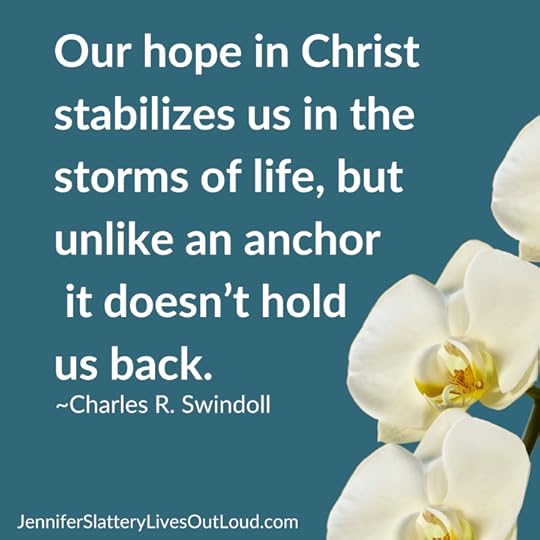
Living Unafraid in the Storms of Life
by Grace Fox
The bus on which I was a passenger cruised east through the rugged Rocky Mountains before turning north. We drove through miles of rolling sage-covered hills and acres of evergreens charred by recent forest fires, past lakes and log cabins, and alongside rivers and expansive ranches where cattle grazed.
I’d traveled this road more than fifteen times and always marveled at the scenery’s beauty, but this time I saw something different: ominous black clouds. I’ve seen rain clouds many times in my life, but they never looked like this. These hovered menacingly over the horizon like a big, bad bully daring us to approach. The only way to reach our destination is to drive through the deluge, I thought.
The likeness to our life’s journey astounded me. At some point, we all face those ominous black clouds, and we have no option but to drive through the storm: the loss of a loved one, an unexpected medical diagnosis, financial troubles, infertility, and betrayal, to name a few.
None of us choose that route. We’d all rather take a detour than drive through the onslaught. But here’s the good news: God’s children don’t go through it alone. And we can be confident this is true because of who God is.

God manifested various aspects of His character to mankind through His Hebrew names. Each name is like a facet on a cut diamond, reflecting a specific characteristic that gives us a glimpse of His glory and a better understanding of what He’s like. One of these names is Yahweh Shammah (pronounced “SHAHM-mah”). It’s found in Ezekiel 48:35 and means, “The LORD is there” (NASB).
It’s easy to read the meaning and say a simple, “That’s nice.” But, my friend, these words deserve more than a quick nod. Their truth contains the power we need to face the storm with courage that, no matter what it looks like, God is with us.
For instance, “the LORD” points to the one true God. There is no other like Him. He is the creator of heaven and earth. He alone is holy, mighty in power, and perfect in wisdom. He alone is sovereign over every detail of our lives. This is the one who is with us. It doesn’t get better than that.
The wee word “is” declares God as present tense. Because of who He is, the LORD has no expiration date. He existed from before time began, and He’s still present and relevant for us today just as He’ll be present and relevant for the generations yet to come.
“There” suggests everywhere. Look around—to the north, south, east, west. Look in your closet and under your bed. Stand in a valley and gaze at the hilltops above you. Look out an airplane window at the expanse 36,000 feet beneath you. Where is God? He is there.
“The LORD is there” sounds so simple, but it’s profound. When our life’s journey leads us around a bend where ominous clouds hover, God is already there, so we never need fear going through the storm alone. Of this we can be confident because of who He is—Yahweh Shammah.
Where can I go from your Spirit? Where can I flee from your presence? If I go up to the heavens, you are there; if I make my bed in the depths, you are there. If I rise on the wings of the dawn, if I settle on the far side of the sea, even there your hand will guide me, your right hand will hold me fast. Psalm 139:7-10 NIV
***
I recently interviewed Grace on finding courage through the names of God on the Faith Over Fear podcast. That episode will drop on the 16th. Watch for it! I know Grace’s insights will encourage you and strengthen your faith!
Get to Know Grace Fox:
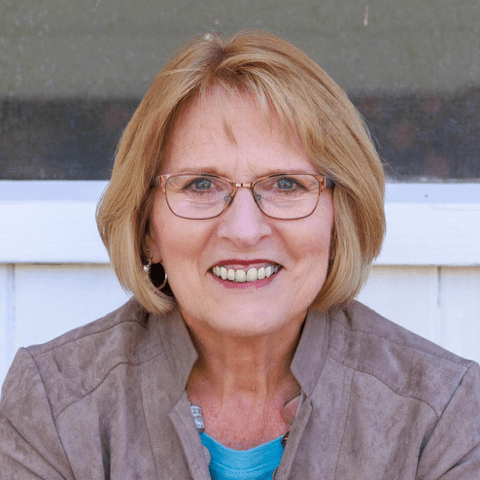
Grace Fox is the award-winning author of 14 books and a popular Bible teacher at international women’s events. She’s also a member of the “First 5” Bible study writing team (Proverbs 31 Ministries), and a co-host of the “Your Daily Bible Verse” podcast. Her latest book, Names of God: Living Unafraid comes with video access and makes an ideal group study, taking readers into a deeper understanding of seven of God’s Hebrew names.
Grace has been a career missionary for more than 30 years. She and her husband have worked in Nepal, at a year-round Christian camp on an island off Canada’s west coast, and are now co-directors of International Messengers Canada, a missionary sending agency with 300 staff in more than 25 countries. They currently live fulltime aboard a sailboat in Vancouver, British Columbia. Married in 1982, they celebrate three grown kids and 14 grandchildren.
Visit her on her website, on Facebook, Instagram, YouTube, and follow her on her Amazon page.
Grace’s Latest Release, :

Get refreshed and equipped with seven powerful names of God in this highly engaging and interactive devotional study (with FREE guided video content from the author)! Packed with fresh insights, word studies, cultural context, thought-provoking reflections, and practical action steps, these studies will give you a solid understanding of God’s character so you can find peace and hope amidst life’s toughest moments.
Our world is a scary place. Focusing on the chaos can paralyze us with fear, but instead, we can anchor ourselves in the truth of who God is, and live unafraid. The Living Unafraid devotional study will help you build an unshakeable foundation of trust in God by empowering you with God’s character as revealed through his names in Scripture. Each of the seven chapters in this devotional study book explores:
A powerful name of God (including pronunciation, scripture reference, translation, prayer, and a word study)FREE accompanying video insights, accessible online (optional)Key background information, in-depth overviews, and cultural contextFresh insights, practical action steps, and eye-opening reflections questionsAnd so much more!How to Use the Names of God : Living Unafraid Book & Video Study
Buy it .
https://www.lifeaudio.com/faith-over-fear/July 4, 2024
Holy, Intimate Wrestling with God
(Copy edited by Aneah Epshteyn.)

(Image first used on March 31, 2022 in THIS post.)
Do we proclaim, “God’s ways are higher than mine” (Is. 55:8-9) too soon? While true, God never intended us to use this statement to silence our questions and numb our discomfort in painful situations. Not only does our faith grow exponentially during wrestling seasons, but our very willingness to engage reveals a depth of trust I’m certain touches our Father’s heart.
Only one secure in their mom or dad’s unconditional love can express their most anguished emotions, especially when they blame that parent for their pain. Those conversations, as excruciating as they might feel, can lead to deeper relationships. In pushing past surface niceties to the most hidden places in the soul, they forge a connection not experienced otherwise.
Parenting an adult child profoundly elevated my appreciation for this holiest of struggles. When my daughter left for college, her physical distance and maturity widened her view of me, my parenting, and how both had affected her. She came to realize that I possessed flaws and that they’d caused her pain. In the years following, she shared some of these wounds with me in conversations we both found excruciating.
I imagine there were many times she debated keeping silent. There were certainly numerous occasions in which I wished she had! At least, in the moment. Standing on the other side of that uncomfortable and healing season, I’m grateful for her courage because I’ve witnessed the converse. I’ve watched other young adults and their parents grow increasingly distant due to unresolved hurts that remained undisclosed, out of fear.
While I can’t speak to other people’s motivation, I can share what my daughter told me one afternoon not long ago. “You were always a safe person for me to come to,” she said.
I take this to mean that she knew, even when I didn’t always react well in the moment, that I would always reach for her. Just as, through those raw and frightening conversations, she was reaching for me.
These were my thoughts as I contemplated the words of Habakuk, the Old Testament prophet living during a dark period of ancient Israel’s history. Granted, unlike me, our Heavenly Father is always the perfect parent. But that doesn’t mean His kids won’t respond to His actions with intense emotion. In Habakuk’s dialogue with God, we see a courage and trust that drove him straight to his Father, and the unconditional, healing love that met him there.
The prophet launched this lyrical discussion asking God how long He’d remain silent to his cries for help and tolerant to violence and injustice. The Lord responded by the foretelling of Babylon’s invasion. Increasingly distraught, Habakuk said, in essence, “How could You, the Holy One, do such a thing?”, adding in chapter two: “I will stand at my watch and station myself on the ramparts; I will look to see what He will say to me, and what answer I am to give to this complaint” (v. 1, NIV).
I envision him with feet planted and arms crossed, determined not to drop the matter until the Lord responds. Does that seem brazen? Were we to encounter similar behavior from a brother or sister in Christ, would we view their words as rebellion? Or the raw expression of an anguished child to the one Person whose comfort they most crave?

The book of Habakuk assures us that Christ is and always will be our safe place. When we live in that reality, as the prophet did, we reach a firmer understanding that, indeed, God’s thoughts and ways are higher than ours. We reach a place of greater trust where we also can say, no matter what happens, “I will rejoice in the Lord … The sovereign Lord is my strength” (Hab. 3:17-19, NIV).
Let’s talk about this! When you think of wrestling with God, what feelings arise? What are your thoughts regarding Habakkuk’s interactions with the Lord? How can allowing ourselves to wrestle with God lead to deeper faith and relational intimacy with the Lord?
Before you go, did you know Faith Over Fear now has a GodTube channel? You can find it HERE!
https://www.lifeaudio.com/faith-over-fear/June 27, 2024
Finding Our True Selves––the Unveiling of Faith
(This first published in 2020.)
We can’t live like a queen while prancing through the pig sty, and make no mistake, you and I are royalty of incredible value. Learning to live in this truth, changes everything—our behavior, perceptions and interactions. This reality increases our freedom, just as surely as not grasping this truth leads to slavery.
Years ago, our family opened our home to a young woman who hadn’t a clue who she was.
She believed she held no worth outside of her looks and whatever attention she gained from boys. She received what she sought, at least, on the surface. Her phone constantly lit up with messages from young men who spoke charming words in the moment, only to use her. Although her friends bathed her in compliments, her emptiness remained.
I’m convinced Christianity is less about becoming and more about unveiling who we truly are; who we were created to be. It’s like, prior to Jesus, we’ve all suffered from a case of mistaken identity. We’ve allowed all the voices of the world to confuse and define us, leaving us insecure and bruised. But as we draw closer to Christ, He whispers to our hearts, “That, my child, is not who you are, who I created you to be. You’re mine. You’re loved, fully and eternally. A creature of inexpressible value, hand-crafted in My image, to shine as a beautiful reflection of me.”
In Genesis 1:26, God said, “Let us make mankind in Our image, in Our likeness …” In the original Hebrew, “Let us make mankind as Our shadow …”
When my daughter was young, she loved making her shadow dance and jump. When she skipped, her shadow did as well. It twirled as fast or as slow as she did, remaining, forever connected to her, the form it represented. The greater the light, the stronger and more defined her shadow. Similarly, as the light dimmed, her shadow faded.
In other words, we discover our truest selves not by chasing after success, accolades, or approval. To the contrary. That will only blur our edges and distort our true beauty. We find ourselves in the One who loves us, 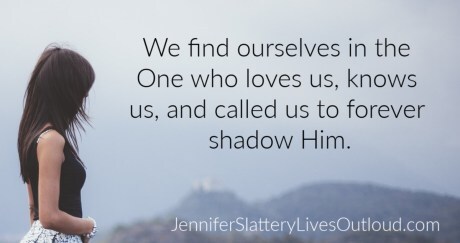 knows us, and called us to forever shadow Him.
knows us, and called us to forever shadow Him.
The apostle Paul, who wrote much of the New Testament, understood this. When speaking to the ancient Ephesians he recognized heir behaviors and weaknesses, absolutely. But he saw their Christ-centered identity first. God their Father had called them out of the pig sty and to Himself. And lest they feel tempted to prance back to the muck they’d once danced in, Paul reminded them, emphatically, “That is not who you are!”
He told them they were God’s holy people (v. 1). They were far from lacking, for they were abundantly blessed. They weren’t rejected or cast aside. To the contrary, they were chosen by the supreme Creator Himself. They were to shake off the memories of every slimy pit they’d once fallen into, for God had declared them holy and blameless, redeemed and forgiven.
That was their true identity. Their challenge, then, was to learn to live in that reality. They needed to learn to live in grace as children of grace.
We do as well, because identity changes everything, and Christ paid much too high a price for you and I to ever go tiptoeing through the pig sties again.
So how do we do this? By allowing God to change the way we think until our thoughts mirror His, because His thoughts always lead us toward His love and truth. He always leads us toward the absolutely best versions of ourselves. May we never accept the cheap substitutes our world tries to force upon us ever again.
If you’re struggling to live anchored in your true identity, you might find my conversation with Grace Fox in my sixth podcast episode, Moving Past the Fear of Insignificance helpful. You can find it HERE.
Connect with me on Facebook and Instagram.
Additional resources:
Nothing to Prove by Jennie Allen
Reclaiming Our Identity, video presentation, session one in the Becoming His Princess Bible study.
Anchored and Secure: Sixty Days of Resting in Grace
Thanks to Christ’s death and resurrection, we don’t have to stress, strive, or perform. We simply need to rest in what Christ has already done. That is when we begin to come alive and find the power and courage to live as He intended. That’s when we experience true and lasting freedom. This sixty-day devotional helps women reflect on God’s grace and the freedom of living deeply anchored in Him.
Before you go, fun news! Faith Over Fear is now on GodTube. Find us HERE! (We’re working to upload past episodes now.)
Catch the latest episode (in audio) HERE.
June 20, 2024
When You Feel Spiritually Weary – Guest Post by Kathy Howard
We all endure exhausting and discouraging seasons. How can we rejuvenate our souls when the climb ahead of us feels insurmountable? Thankfully, as today’s guest relays, if we’ve trusted in Christ for salvation, we can also trust that we’ll never take one step alone.

Hope for the Spiritually Weary
by Kathy Howard
My husband and I enjoy spending time on St John, the smallest of the three U.S. Virgin Islands. However, getting there is not easy. It requires planes, taxis, and a ferry. But weary travelers are rewarded with incredible beauty and the peace that comes from smaller crowds. We wanted to share our favorite island paradise with our kids and grandkids, so a few years ago we arranged a family trip. Our group of thirteen ranged in age from almost three to sixty-three.
They exhibited a lot of excitement on the first leg of the trip. But by the time we changed planes in Miami, then landed in St. Thomas, where we endured a long wait for our luggage even the most travel-hardy among us were weary. And of course, the little ones just wanted it to be over.
Wayne and I tried to energize them with descriptions of the sunsets and stories about our favorite beaches and snorkeling trips. While our efforts didn’t accomplish a complete makeover, it did bolster them enough to finish the journey. By the end of the vacation they all declared they would do it again!
The Jewish Christians who first received the letter we know today as “Hebrews” were “road weary.” Following Jesus had led them into some painful, difficult places. Although they had not yet died for their faith, they had endured public reproach, imprisonment, and the confiscation of their property. Due to this persecution, they were considering abandoning their faith in Jesus and returning to Judaism. So the author of Hebrews harshly warned them that if they rejected Jesus they would not find salvation in the Jewish faith (Hebrews 10:26-31). The Law of Moses only revealed sin, it could not cleanse it.
Then the author followed the warning with an exhortation to hold onto their faith in Christ. He asked them to remember what they’d already endured and urged them to keep an eternal focus. He also encouraged them to patience. God might seem slow to deliver, but if they persevered, the Messiah would return and bring justice. The earthly hardships would soon pass, but the spiritual benefits would last forever.

Therefore do not throw away your confidence, which has a great reward. For you have need of endurance, so that when you have done the will of God you may receive what was promised. Hebrews 10:35-36 NASB
The author also reminded them of their joy in the face of past suffering (Hebrews 10:34). Although seemingly counterintuitive, we see this spiritual principle throughout Scripture. For instance, Peter described suffering for Christ as a blessing and privilege because the “Spirit of glory and of God rests upon you” (1 Peter 4:14). Persecution in this life for the name of Christ makes us partners with Him in His suffering and means we will share in His glory in the life to come (1 Peter 4:13).
Like those first century Jewish Christians, too often our fear of persecution outweighs our joy of anticipation. But we must not become discouraged and turn back. Suffering is temporary, but the reward is eternal. Let’s keep our eyes on Jesus and our focus on eternity. One day our temporary suffering will yield to unimaginable blessing.
This post was adapted from Kathy’s new devotional book “Deep Rooted: Growing through the Book of Hebrews.”

About the author:
Kathy Howard is a treasure hunter. She hunts for the creamiest chocolate, richest coffee, and cherished stories of faith. She also digs deep into Scripture, mining God’s eternal truths. Kathy has a Masters in Christian Education and has taught the Bible for more than 30 years in a wide variety of venues. Kathy is the author of 14 books, including “Heirloom: Living and Leaving a Legacy of Faith” and the “meaty” devotional series “Deep Rooted.” Kathy and her husband live in north Texas. They have three married children and six grandchildren. Find free discipleship resources at www.KathyHoward.org.

About her Devotional:
Are you spiritually exhausted? Following Jesus can be hard. Discouragement, difficulties, and defeat often wear us down. So, why bother? The book of Hebrews answers that question. This 40-day devotional journey provides encouragement to run our race of faith with endurance and reminds us that our Savior is far superior to anything and everything the world can offer.
Like the rest of the Deep Rooted devotional series, the Hebrews volume uses the 4-R Bible study framework to help you learn how to interact with and respond to Scripture, not simply read it. These meaty, daily devotions will increase your hunger for God’s Word, encourage spiritual growth and stability, and lay the groundwork for a life-long, spiritually-healthy habit.
New American Standard Bible®, Copyright © 1960, 1971, 1977, 1995, 2020 by The Lockman Foundation. All rights reserved.
The “NASB,” “NAS,” “New American Standard Bible,” and “New American Standard,” are trademarks registered in the United States Patent and Trademark Office by The Lockman Foundation. Use of these trademarks requires the permission of The Lockman Foundation.
https://www.lifeaudio.com/faith-over-fear/June 13, 2024
The God Who Sees and Acts

(This first published April 29, 2021)
When my world was coming undone during my teenage years, I felt alone. I thought for sure God had turned His back on me, and honestly, I expected Him to. I certainly wasn’t doing anything to draw Him to me. To the contrary. My behavior had given Him every reason to walk away.
When my marriage was struggling and my husband quit his job mere months after moving our family across the country, far from the close-knit community we’d grown so attached to—I felt unseen then as well. Abandoned.
I told God, quite clearly, all about it. Actually, more accurately, I cried out, “Don’t You see, Lord?”
I’ve hurled that accusation at my Father numerous times throughout my life, only to later realize the inaccuracy of my perceptions. In fact, more often than not, it was during those frightening and heart-wrenching moments that God was doing His greatest work. He was lovingly, carefully creating beauty from my rubble.
He saw me in my pain, in my mess, even in my rebellion. In each instance, His compassion moved Him to action and His action brought increased life.
This has always been Christ’s way. When others reject us, He seeks us out. When we’re betrayed, He stands beside us as our most loyal and ever-present friend. When life feels chaotic, He remains a firm, immovable rock beneath our feet. And He comes to us when we’re overwrought with despair.
Before we can even speak the word, He’s there.

Just as He was, some two-thousand years for a poor widow who’d lost her only son. As a parent who adores her daughter, I can’t imagine the pain this woman felt as a mom. Agony exacerbated by her utterly destitute state. In her male-dominated society where the majority of women were completely dependent on men, her situation probably felt hopeless. Today’s equivalent of losing a child, a job, all resources, and your ability to work in one day.
Did she cry out for God’s miraculous intervention, His presence—prior to her son’s last breath or after?
Did she feel abandoned in her pain?
Or was her heart too broken for her mind to even form a cohesive thought, let alone for her to utter the words, “My God, please help.”
We don’t know how she did or didn’t respond, did or didn’t pray. And that is precisely why this account is so powerful.
Luke 7:11-13 states, “… Jesus went to a town called Nain, and His disciples and a large crowd went along with Him. 12 As He approached the town gate, a dead person was being carried out—the only son of his mother, and she was a widow. And a large crowd from the town was with her. 13 When the Lord saw her, His heart went out to her and He said, ‘Don’t cry’” (NIV).
Notice, the woman didn’t ask for His help. So consumed with her grief, she might not have even known Jesus had come to town. But He knew her and felt deep compassion for her pain. The original Greek literally means to be moved in one’s bowels. When was the last time something hit you so strongly, you experienced a gut reaction? As a mom, I’ve felt that way numerous times—times when my intense emotions for my beloved daughter elicited a physical reaction.
If you’re a parent, you can probably relate. Our hearts are intricately tied to our kids, am I right?
Just as, I believe, Christ’s heart is inseparably tied to ours.
This story assures us Christ sees and He cares. Our pain does much more than stir His emotions. It moves Him to action as well.
“Don’t cry,” He said. 14 “Then He went up and touched the bier they were carrying him on, and the bearers stood still. He said, “Young man, I say to you, get up!” 15 The dead man sat up and began to talk, and Jesus gave him back to his mother” (V. 14-15, NIV).
He met the woman in her pain, in her need, and brought life to what she and everyone else deemed irrevocably dead.
This story reminds me that no situation is so bleak that God’s light can’t break through.
Is there an area of your life that feels beyond hope? How does Jesus’s response to this grieving widow from Nain help breathe fresh life into your circumstances today?
Share your thoughts in the comments below, and make sure to connect with me on Facebook and Instagram, and subscribe to my YouTube Channel.
Before you go, make sure to listen to the latest Faith Over Fear podcast episode:
https://www.lifeaudio.com/faith-over-fear/the-courage-to-share-jesus-with-others-ep-51June 6, 2024
For Those Who Fear they’ve disappointed God – Guest post by Debbie Wilson

I’ve become increasingly aware of how often we tend to interpret Scripture based on ideas, perhaps those we don’t consciously realize, developed from a lifetime spent in our often punitive culture. Our greatest healing and transformation come as we discover who He truly is and live in alignment with that.
For those who often feel like a disappointment, may you gain comfort and encouragement from Debbie Wilson’s post below.
For Those Who Fear They’ve Disappointed God
by Debbie Wilson
Do you think God is disappointed in you? He’s not.
You cannot shock or disappoint God. How do I know this? Because the Bible says that we were chosen “according to the foreknowledge of God the Father” (1 Peter 1:2 NIV). In other words, God knew everything about you and me before we were born, before He chose us.
He knew everything He was getting in me, yet still chose me to be His child and to represent His Kingdom. That is not a pass to misbehave. It is an incentive to get up when I fall—to press on. God knows He did not make a mistake in choosing you or me. He will fulfill His purpose in us. He knows the Spirit won’t fail to form Christlikeness in us (1 John 3:2-3).
We disappoint when we fail to meet someone’s expectations. Since God knew everything about me before I was born, my falls don’t surprise Him. Because I’m still learning the depth of sin’s influence, I’m shocked and disappointed with myself when sin rears its ugly head. But God isn’t.
I imagine Him thinking, Dear child, you think that is bad, you haven’t seen the half of it. There is more where that came from. But My Son’s blood covered that too!
I may not disappoint God, but I can sadden Him. When I cave in to sinful impulses and disobey His wise standards, I hurt Him, myself, and others. Knowing this would happen, God provided the blood of Jesus to continually wash us, so we can continue the process of being transformed into the image of Christ (1 John 1:5-10).

Wallowing in self-condemnation and guilt paralyzes and sidelines us from our higher calling. Holding on to shame is destructive and makes us self-conscious instead of Christ-conscious. Just as God knew Adam and Eve would fall, David would miserably fail, and Peter would deny Him, He knew you and I would mess up. Yet, He still chose them—and us—to be part of His forever family and build His kingdom on earth.
What have you done to disappoint yourself? Admit it to God and experience His forgiveness. He already knows; He’s not shocked. He stands ready to restore you and get you back on track. He loves you with the love of a perfect Father.
” … who have been chosen according to the foreknowledge of God the Father, through the sanctifying work of the Spirit, to be obedient to Jesus Christ and sprinkled with his blood: Grace and peace be yours in abundance” (1 Peter 1:2).
Adapted from Give Yourself a Break by Debbie Wilson.
More About Debbie’s Book, Give Yourself a Break:

Give Yourself a Break is an interactive study that will help you experience Jesus in ten areas that commonly cause stress. Learn how stop worry and guilt, reframe how you view unreasonable people and your work, and win the battle in your mind and with temptations. Experience the sweet peace that comes only from trusting Jesus. https://debbiewwilson.com/give-yourself-a-break/
Get to Know Debbie Wilson:

Debbie W. Wilson is an award-winning author, Bible teacher, and former Christian counselor who speaks and writes to connect fellow sojourners to the heart of Christ. She and her husband lead Lighthouse Ministries, a non-profit Christian counseling and Bible teaching ministry. Despite time in Boston, the Midwest, and Southern California, Debbie still says y’all. Her family, which includes two grown children and two mischievous standard poodles, calls North Carolina home. Connect with Debbie, find free resources, and learn about her books at debbieWwilson.com.
May 30, 2024
Growing Through the Hard Stuff––Guest Post by Jessica Brodie
(This first posted on September 10, 2020.)
Imagine if we could all orchestrate life precisely as we desired. I’m certain most of us would seek out a pleasant, serene, and problem free existence. But would we also appreciate the immaturity that would necessary follow? While this isn’t my favorite truth in Scripture, I’ve discovered my greatest growth often comes during my most challenging times. This has been my guest’s experience as well.
(A brief note regarding my guest’s post below. Please know she is not referring to trauma, such as abuse. We understand the long-term devastation of such wounds. Rather, she is sharing how God used her pain of infertility and encouragement through James 1 to grow her strength in preparation for later challenges she experienced.)
Growing Through Hardship
Have you ever experienced a season in your life you thought would never end?
My struggle with infertility felt like it took forever. When I found out it was probably because my cycles were a little “off,” I thought, “No big deal. I’ll just take a pill, get back on track hormonally, and I’ll be pregnant in no time.”
Except I wasn’t.
Next I had minor surgery to scan my insides and make sure there wasn’t something else amiss. Two tiny scars and a lot of worries later, and that too was checked off the list—no problem there. It just boiled down to wonky hormonal imbalances. That and time.
Oh, time—the hardest struggle of all.
As the days passed, my obsession with my fertility only increased. Would it happen this month? How about this month? Surely, now…
Nope. Nothing. Two, then three friends had babies.
I began to realize pregnancy might never happen for me. I had to figure out a way to reconcile with that without it killing my soul. Finally, I surrendered to the truth—God had a plan for my life, and if it didn’t include birthing children, I’d adopt or figure out some other way to be a mom. Either way, I learned to embrace the hardship. I found joy in the center of my pain.
Long walks turned into meditative moments with God, and I realized, one way or the other, everything was going to be OK.
Later, I did get pregnant. Now I have two kids and two step kids, ages 11, 12, 13 and 14, and I look back on that time and see what I couldn’t see then: that trial was a testing period in my life. It was a struggle that taught me to rely on God, to trust His plan for my life, and to surrender my own desires for whatever mysteries He had in store for me.
It wasn’t easy. That time produced a bucket of tears and a lot of anguished nights. But the experience strengthened me as a woman of  God. It helped me cultivate soul-survival skills I didn’t know I possessed.
God. It helped me cultivate soul-survival skills I didn’t know I possessed.
The apostle James writes that we should consider it “joy” whenever we face trials. As he says, “You know that the testing of your faith produces perseverance. Let perseverance finish its work so that you may be mature and complete, not lacking anything” (James 1:2-4).
Because I learned to persevere in my faith even through difficulties and disappointments, I grew as a woman. I matured and ripened. It prepared me for even harder struggles I experienced later, including divorce and poverty. And it helped me blossom as a daughter of God, ready and willing to shove my own wishes aside to truly embrace whatever it is He has planned.
Hardship usually isn’t fun. But looking back on previous difficulties shows me God’s hand in a perspective I didn’t see at the time. I’m grateful for the hard times, for they’ve made me to woman of faith I am today. And I don’t fear the hardships ahead of me.
For as the apostle Paul declares, “I know what it is to be in need, and I know what it is to have plenty. I have learned the secret of being content in any and every situation, whether well fed or hungry, whether living in plenty or in want. I can do all this through him who gives me strength” (Philippians 4:12-13).
Get to Know Jessica!

Jessica is an award-winning journalist and author with thousands of articles to her name. She is the editor of the South Carolina United Methodist Advocate, the oldest newspaper in Methodism, which has won 104 journalism awards during her tenure. She is author of More Like Jesus: A Devotional Journey (2018) and editor of Stories of Racial Awakening: Narratives on Changed Hearts and Lives of South Carolina United Methodists (2018), both from her newspaper’s the Advocate Press. She also writes fiction, represented by Bob Hostetler of The Steve Laube Agency, and her novel The Memory Garden won the 2018 Genesis contest for unpublished contemporary fiction from the American Christian Fiction Writers. A speaker and frequent contributor to Response magazine and the United Methodist News Service, among many other publications, she has a faith blog at JessicaBrodie.com. Subscribe to Jessica’s YouTube channel HERE.
https://www.lifeaudio.com/faith-over-fear/
May 16, 2024
How God Speaks: When We Seek His Heart
(This is a repost from April 30, 2020)
We all want to hear from God. At least, many of us do. We want that special revelation, to receive that call, or perhaps the answer to that problem or decision we’ve been wrestling over. I’ve been in that place so many times, and I’m certain I’ll land there again. But while God indeed wants us to continually seek His guidance, His desire for us go so much deeper.
He wants our hearts. He wants us. All of us. And He wants us to want Him—more than His answers or solutions. When I’m in that place of wrestling, I have to ask myself, what do I want more? That “special word” from God or God to connect with God Himself?
And here’s what’s beautiful. When I seek God’s presence above all else, His guidance follows. In fact, His guidance becomes a part of me as He gently yet consistently molds my heart and will and transforms my thinking.
I hear Him most clearly when I lose myself in Him and make Him and Him alone my prize. What a tender, loving, and faithful Father He is! He draws me to Himself, invites me to worship, and then, in this context of love—love from Him to me and me to Him—He speaks. And in that moment of divine intimacy, all confusion, angst, and anxiety flee as confidence and courage well within.
He inspires me to do His will and empowers me for whatever’s ahead. This has always been His way.
The apostle Paul, perhaps the most effective and empowered missionary of all time, is a great example of this. You can read about his history and journeys in the book of Acts, but to paraphrase, while he was vehemently seeking to persecute God’s children, Christ intervened, transformed him, and ignited within him a new, life-giving passion to share the gospel.
That’s God’s call for all of us—to proclaim the power and reality of grace. But we each also have a more unique, more defined call as well, perhaps to mentor youth or write encouraging letters to shut-ins or teach Bible studies to young moms.
Some of you may have discovered how God wants to use you in this season, but perhaps you’re not quite certain. Maybe you’re in a period of waiting and God seems silent, and so you’re asking, maybe even begging, for Him to reveal your next steps. I get it. Those “blurry” periods can be difficult and painful, and in the waiting, we might be tempted to seek God’s call more than we seek Him—forgetting that He alone is the source of all that is good and hope-filled, fulfilling, and true. Forgetting that He is faithful to give us all we need, answers included, when we need it.
There’s a sense of rest, and power, displayed by those who get that, who’ve learned to consistently quiet themselves in God’s presence, 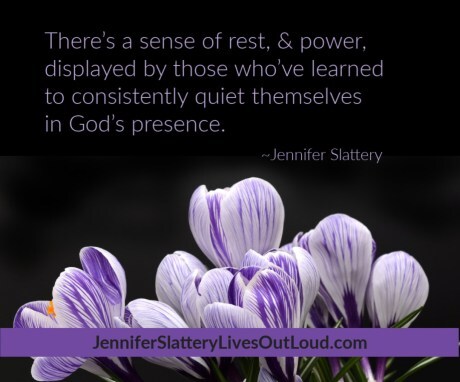 and to seek His presence above all. Paul exemplified this. “For me to live is Christ,” he wrote, “and to die is gain” (Phil. 1:21, NIV). It was from that sense of devotion, of connection, that he received his unique, history-changing call to share Christ with the Gentiles. Acts 13:2 tells us while the prophets and teachers at Antioch “were worshiping the Lord and fasting, the Holy Spirit said, ‘Dedicate Barnabas and Saul for the special work to which I have called them” (NLT).
and to seek His presence above all. Paul exemplified this. “For me to live is Christ,” he wrote, “and to die is gain” (Phil. 1:21, NIV). It was from that sense of devotion, of connection, that he received his unique, history-changing call to share Christ with the Gentiles. Acts 13:2 tells us while the prophets and teachers at Antioch “were worshiping the Lord and fasting, the Holy Spirit said, ‘Dedicate Barnabas and Saul for the special work to which I have called them” (NLT).
In the middle of worship, God spoke.
That’s often how He interacts with us as well, because while, yes, He longs to guide us, He longs for us more.
There’s a sense of rest, and power, displayed by those who get that, who’ve learned to consistently quiet themselves in God’s presence, and to seek His presence above all. Paul exemplified this. “For me to live is Christ,” he wrote, “and to die is gain” (Phil. 1:21, NIV). It was from that sense of devotion, of connection, that he received his unique, history-changing call to share Christ with the Gentiles. Acts 13:2 tells us while the prophets and teachers at Antioch “were worshiping the Lord and fasting, the Holy Spirit said, ‘Set apart for me Barnabas and Saul for the work to which I have called them.’” (NIV).
In the middle of worship, God spoke.
That’s often how He interacts with us as well, because while, yes, He longs to guide us, He longs for us more.
Let’s talk about this! How do you connect with God? When do you tend to feel closest to Him? What are some ways you intentionally cultivate a relationship with Christ?
Share your thoughts in the comments below.
Scripture used from THE HOLY BIBLE, NEW INTERNATIONAL VERSION®, NIV® Copyright © 1973, 1978, 1984, 2011 by Biblica, Inc.® Used by permission. All rights reserved worldwide.
https://www.lifeaudio.com/faith-over-fear/
